Title: The Limits of Design
Location: London
Link out: Click here
Description: Designing for Security and Sustainable Development
Start Time: 7pm
Date: 2009-11-11
End Time: 9pm
Source: CSF
Title: The Limits of Design
Location: London
Link out: Click here
Description: Designing for Security and Sustainable Development
Start Time: 7pm
Date: 2009-11-11
End Time: 9pm
Source: CSF
Title: Beyond Green
Location: Amsterdam
Link out: Click here
“This year the symposium again includes a Beyond Green Gallery with presentations on innovative projects by young designers and grass-roots organizations, and exhibition stands manned by numerous companies connected with fashion, textiles and sustainability. A swapshop will also take place where visitors can exchange (closed purse) vintage items. The Beyond Green Gallery will be coordinated by I&A, Ingrid Horsselenberg & Annouk Post.
The symposium will be held in English, and is aimed principally at the students and staff of Dutch fashion and design institutes. It will be held from 10am to 5pm on 9 November 2009 in the World Fashion Centre (Koningin Wilhelminaplein 13, 1062 HH) in Amsterdam.
Press can register via the AMFI-Amsterdam Fashion Institute: m.m.van.de.beek@hva.nl (also for more information about Beyond Green)” (Beyong Green)
Here is the line-up of speakers:
Kate Fletcher, author of Sustainable Textiles: Design Journeys (2008), will be speaking on the topic of “Fashion and Sustainability,” Adriaan Beukers, a full-time Professor on Composite Materials & Structures at the Faculty of Aerospace Engineering at Delft University of Technology and a part-time professor for Engineering with Composites at the Materials Department of the Leuven University, as well as co-author of the books Lightness (1998) and Flying Lightness (2005) will be speaking on “Light Weight,” Fashion Designer Mark Liu on “Zero Waste,” and Carolyn Strauss of slowLab will be speaking on “Slow-Design-Slow Fashion.”
There will also be a “Green Gallery,” divided into four parts, the Information Space, the Showroom, the Exhibition, and the Swap Store.
Here is the list of designers who will be presenting their innovative work in the Exhibition:
Start Time: 10:00am
Date: 2009-11-09
Source: Hiphonest and Behond Green

Upcoming Event
Chasing Sustainability Conference
Liu Institute for Global Issues
November 6, 2009, 9:00 am – 4:00 pm
In today’s evolving economy, business leaders are faced with the challenge of what it means to be truly sustainable. Similarly, students are aware that in order for them to stay at the forefront of this transformation, it is critical that they understand responsible business practices. CUS Sustainability seeks to intertwine business education and sustainability through interactive activities, dynamic speakers, and enlightened discussion at our annual conference, Chasing Sustainability, taking place November 6th, 2009.
In this effort to educate and stimulate, the CUS Sustainability team invites business professionals, environmental leaders, and university faculty to share their expertise with respect to this broad subject. The Chasing Sustainability conference provides an intimate and discussion-oriented setting for engaged and globally-minded students to learn how business can remain competitive economically while simultaneously bettering their environmental and social interactions.
Come register at David Lam Library in the UBC Henry Angus Building.
To download the poster, please click here.
For more information, please visit: http://cussustainability.com/
One of the arguments against fair trade or ethical fashion I hear consistently is that it is not a profitable model. Is this true? Maybe the fashion business needs to reconsider their assumptions. People Tree is just one example of a fashionable, profitable and fair trade fashion label:
Inside Fairtrade fashion – a day in the life of People Tree
Thanks to New Consumer TV for the clip.
As followers of SA likely already know, this online lab was developed as a result of my research, ‘Social Alteration: Sustainable Design Solutions through Socially Responsible Design Education’ at Athabasca University. A few months in, SA has grown to include the work contributing writer and collaborator Nadira Lamrad, as well as contributing writer Katrine Karlsen, and has already created the SA Fibre Analysis as our first piece of free downloadable curricula.
I’m excited to report that Fashioning an Ethical Industry has added this work to the student project/dissertation section of their site! Thank you for your support!
Click here to check it out, as well as to learn more about these inspiring student initiatives:
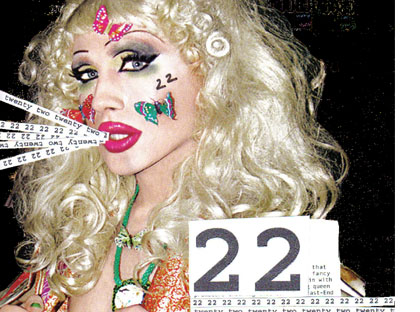 22 magazine
22 magazine
Louise Boulter
University College for the Creative Arts (Epsom)
BA (hons) Fashion Promotion and Imaging

What is ethical wear?
Anita Costanzo
Universita IUAV di Venezia
Corso di laurea in Design della Moda
 ‘Six’
‘Six’
Danielle Fell
Nottingham Trent University
Fashion Marketing and Communications
Graduate
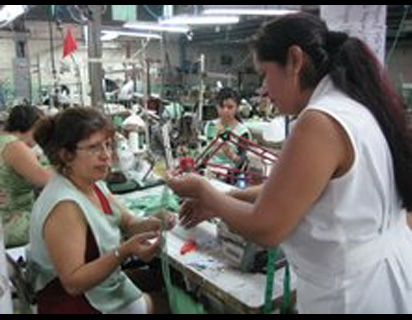 Can El Salvador develop and sustain homegrown design
Can El Salvador develop and sustain homegrown design
Carolina Gomez
Chelsea College of Arts and Design
Textile Design
3rd Year
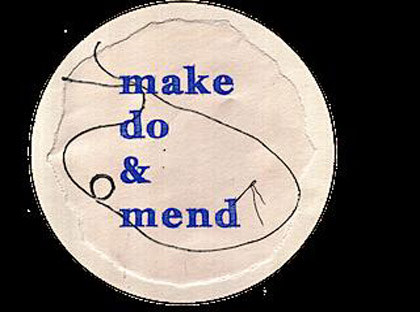
‘Make-Do-And-Mend’
Nathalie Gottschalk
Ma Ethical Fashion Graduate
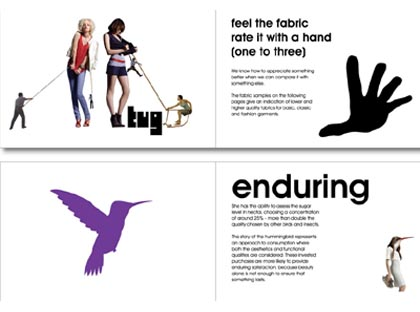 Consumer Guidebook Nectar
Consumer Guidebook Nectar
Cathy Gray
University College of the Creative Arts
Work done in 3rd Year – now graduated
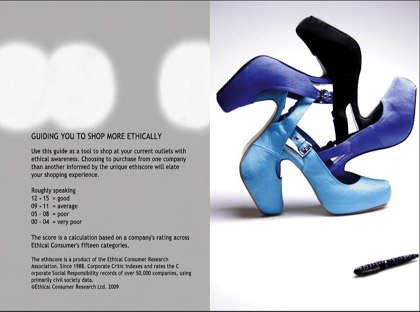 FILM CLIP and ‘Ethical Shopping Guide’
FILM CLIP and ‘Ethical Shopping Guide’
Kelly Levell
Arts Institute at Bournemouth
BA Fashion Studies Degree
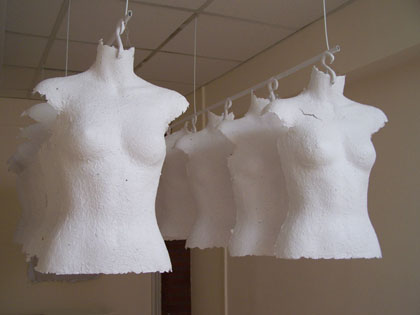 Installation in response to exploitation of garment workers
Installation in response to exploitation of garment workers
Polly Pocock
North Devon School of Art
FdA Fine Art
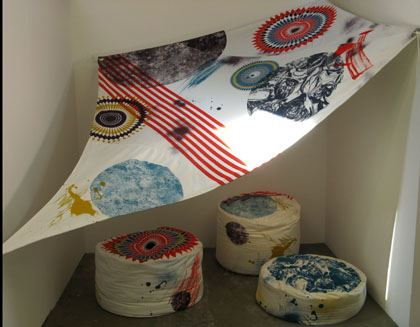 ‘Designing Happiness’
‘Designing Happiness’
Anna Vening
Chelsea College of Art and Design
BA Textile Design
Will you be in New York at the end of October? If so, check out the launch of Ecouterre at KAIGHT.
Here are the event details:
Come sip organic cocktails, nosh on vegan cookies and snacks, browse through racks of sustainable fashion at KAIGHT (15 percent off everything for one night only), and chat about the future of eco-fashion with Ecouterre editors and other readers. If you’re interested in joining the fun, please rsvp@inhabitat.com, tout de suite! Here are the details:
WHAT: Ecouterre Official Launch Party!
WHERE: KAIGHT NYC, 83 Orchard between Broome and Grand, New York, NY 10002
WHEN: October 29, 2009 (Thursday) from 6-9 p.m.
WHO: Team Ecouterre and Inhabitat, including Jill Fehrenbacher, Jasmin Malik Chua, Abigail Doan, Yuka Yoneda, Rebecca Paul, Dan Mendes, and of course, KAIGHT founder and owner Kate McGregor!
HOW: Please RSVP to rsvp@inhabitat.com
Title: BSR Conference 2009
Location: San Francisco, CA
Link out: Click here
The 2009 BSR Conference kicks off tonight in San Francisco with a Human Rights Networking Reception starting at 5:30pm. Of the many interesting panel sessions, including “Integrating Sustainability into Sourcing, Design, and Production of Products” with Amy Leonard and Erik Joule from Levi Strauss & Co’s, Hannah Jones will be discussing Nike’s Considered Design Ethos during the panel “Integrating Sustainability into Corporate Innovation” at 4:30 on Oct. 22nd.
We’ve mentioned Nike’s Considered Design Ethos before (see Nike Talks Trash and Nike: Considered Design Ethos, Steve Nash and the “Sixty Million Dollar Man”).
Check out this article on Greenbiz to learn more about Nike’s Considered Design initiative.
Description:
“In a world that’s been ‘reset’ by a trio of global crises—the sharp worldwide recession, accelerating climate change, and a collapse of trust in business—the implication and opportunities for business are enormous.
“Now more than ever, innovative sustainability strategies are needed to deliver business value today, and position companies to successfully meet the greater challenges ahead. The BSR Conference is an essential opportunity to learn how to leverage your resources, implement changes, and succeed in a world where business as usual is no longer viable.
“Don’t miss your chance to be part of one of the largest and most influential communities of corporate responsibility leaders, at what Forbes.com ranks among the top 12 influential executive gatherings for 2009. A new, restructured format with more—and more varied—session time than ever before means that you will be able to customize your agenda with the topics, level, and length of sessions that are right for you. Any way you design it, the BSR Conference will deliver a practical and interactive learning experience, unrivaled access to industry experts, and the knowledge you need to lead in a ‘reset world.’” (BSR)
Start Date: 2009-10-20
End Date: 2009-10-23
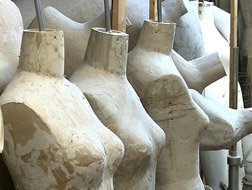 “A cautionary story of labor and greed, Schmatta: Rags to Riches to Rags follows the decline of the once-robust apparel manufacturing industry in the U.S., while chronicling the industry’s relationship with unions and government. From the “Garmento” to the seamstress, from the designer to the marketing maven, from the small businessman to the financier, Schmatta offers a firsthand account of how the industry helped generations of Americans march out of poverty and right into the golden age of the American middle class. But while Schmatta reminds us of the early days of the garment industry and its heyday, it also probes its troubling decline, which has occurred largely within the last 30 years. In 1965, 95% of American clothing was made in the U.S.A.; by 2009, only 5% is manufactured here.
“A cautionary story of labor and greed, Schmatta: Rags to Riches to Rags follows the decline of the once-robust apparel manufacturing industry in the U.S., while chronicling the industry’s relationship with unions and government. From the “Garmento” to the seamstress, from the designer to the marketing maven, from the small businessman to the financier, Schmatta offers a firsthand account of how the industry helped generations of Americans march out of poverty and right into the golden age of the American middle class. But while Schmatta reminds us of the early days of the garment industry and its heyday, it also probes its troubling decline, which has occurred largely within the last 30 years. In 1965, 95% of American clothing was made in the U.S.A.; by 2009, only 5% is manufactured here.
Director Marc Levin focuses his lens on Manhattan’s Garment District, an eight-block area on Manhattan’s West Side which gave birth to the domestic industrial labor movement, and played a key role in major American political activities. From its immigrant origins in the 19th Century, the labor movement rose quickly against deplorable sweatshop conditions. In recent years, however, the realities of automation, deregulation, globalization and outsourcing – all part of the race to the bottom line – eventually eroded the industry’s unprecedented momentum (more)” (HBO Synopsis)
Click here to read the review by Women’s Wear Daily, “HBO Heads Inside the Garment Center” by Rosemary Feitelberg.
Premieres Oct. 19 th-click here for showtimes.

There has been a lot of attention given to the use of chemicals used in textile and apparel production in the past. We have heard of pesticides in cotton farming, dyeing and the finishing treatment of jeans. Many retailers have responded to the pressure from NGOs as well as consumers, and the use of organic cotton has grown exponentially since 2006.
There was only a matter of time before the footwear industry would have to take responsibility for the production of shoes. There are many components in a shoe which have been an excuse many footwear retailers have used to avoid the subject. However, large brands like NIKE and Timberland have showed that it is possible to exclude and replace certain chemicals to make safer products.
On September 14th 2009 the Swedish Society for Nature Conservation published the report ” Chemicals Up Close – plastic shoes from all over the world” where 27 plastic shoes purchased in 7 different countries were tested for hazardous chemicals such as phthalates, heavy metals and tin organic compounds. There was found traces of all in most of the tested shoes.
The damaging implications of these chemicals are large, both for people and the environment. Cancer, liver failure, skin allergies and burns have been identified among workers who are exposed to large amounts over time.
“The environmental toxins in the shoes can spread to people and to the environment as the shoes become worn. There is also a considerable risk of them affecting the people involved in the manufacture of the shoes, says Mikael Karlsson, President of the Swedish Society for Nature Conservation.”
You can find the report here.
The report refers to the new EU legislation on chemicals, REACH, where some of the tested chemicals are subject to be banned or restricted.
Source: Naturskyddsföreningen